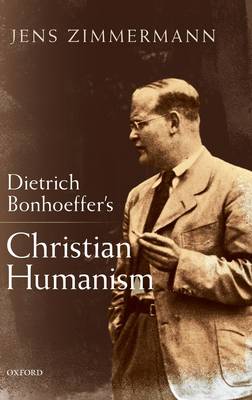
Bedankt voor het vertrouwen het afgelopen jaar! Om jou te bedanken bieden we GRATIS verzending (in België) aan op alles gedurende de hele maand januari.
- Afhalen na 1 uur in een winkel met voorraad
- In januari gratis thuislevering in België
- Ruim aanbod met 7 miljoen producten
Bedankt voor het vertrouwen het afgelopen jaar! Om jou te bedanken bieden we GRATIS verzending (in België) aan op alles gedurende de hele maand januari.
- Afhalen na 1 uur in een winkel met voorraad
- In januari gratis thuislevering in België
- Ruim aanbod met 7 miljoen producten
Zoeken
Omschrijving
Jens Zimmermann locates Bonhoeffer within the Christian humanist tradition extending back to patristic theology. He begins by explaining Bonhoeffer's own use of the term humanism (and Christian humanism), and considering how his criticism of liberal Protestant theology prevents him from articulating his own theology rhetorically as a Christian humanism. He then provides an in-depth portrayal of Bonhoeffer's theological anthropology and establishes that Bonhoeffer's Christology and attendant anthropology closely resemble patristic teaching. The volume also considers Bonhoeffer's mature anthropology, focusing in particular on the Christian self. It introduces the hermeneutic quality of Bonhoeffer's theology as a further important feature of his Christian humanism. In contrast to secular and religious fundamentalisms, Bonhoeffer offers a hermeneutic understanding of truth as participation in the Christ event that makes interpretation central to human knowing. Having established the hermeneutical structure of his theology, and his personalist configuration of reality, Zimmermann outlines Bonhoeffer's ethics as 'Christformation'. Building on the hermeneutic theology and participatory ethics of the previous chapters, he then shows how a major part of Bonhoeffer's life and theology, namely his dedication to the Bible as God's word, is also consistent with his Christian humanism.
Specificaties
Betrokkenen
- Auteur(s):
- Uitgeverij:
Inhoud
- Aantal bladzijden:
- 396
- Taal:
- Engels
Eigenschappen
- Productcode (EAN):
- 9780198832560
- Verschijningsdatum:
- 20/08/2019
- Uitvoering:
- Hardcover
- Formaat:
- Genaaid
- Afmetingen:
- 157 mm x 236 mm
- Gewicht:
- 748 g

Alleen bij Standaard Boekhandel
+ 451 punten op je klantenkaart van Standaard Boekhandel
Beoordelingen
We publiceren alleen reviews die voldoen aan de voorwaarden voor reviews. Bekijk onze voorwaarden voor reviews.









